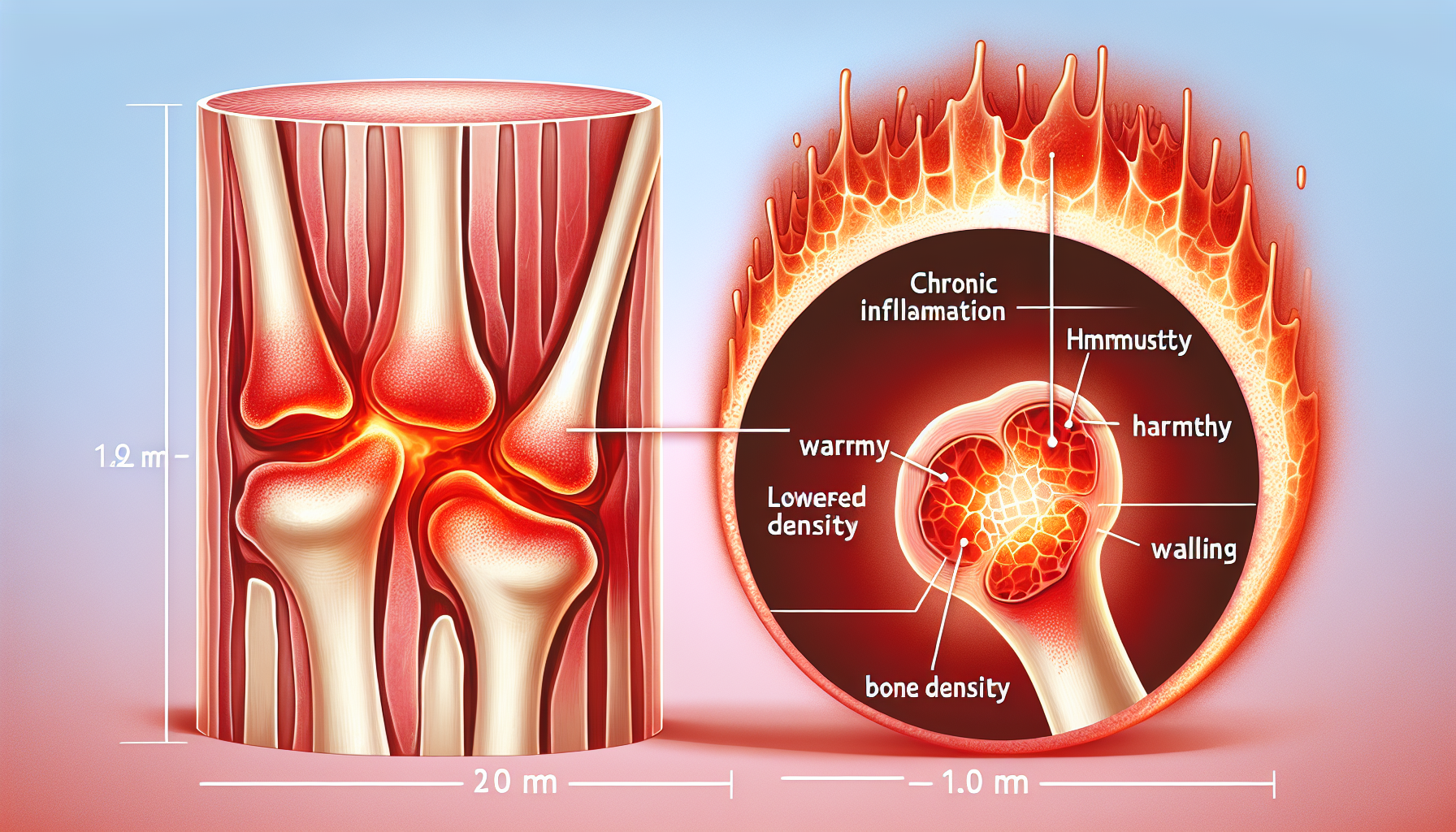Chronic inflammation is an insidious condition that can have far-reaching impacts on various aspects of health, including the integrity of our bones. As a silent adversary, it operates beneath the surface, often undetected until it manifests as a myriad of health issues. Among these is the potential to erode bone density, a critical factor in maintaining a robust skeletal structure. This article delves into the complex interplay between chronic inflammation and bone health, shedding light on the physiological processes involved and offering insights into how individuals can safeguard their bone density against the ravages of inflammation.
The Nature of Chronic Inflammation
Unlike acute inflammation, which is a beneficial and temporary response to injury or infection, chronic inflammation is a prolonged, often low-grade state that can slowly damage tissues over time. This type of inflammation can stem from various causes, including autoimmune disorders, prolonged stress, obesity, and persistent infections or environmental factors.
For a deeper understanding of inflammation’s role in overall health and how it intersects with conditions like arthritis, cardiovascular diseases, and more, consider exploring Avix Health’s comprehensive article on digestive health, which offers valuable insights into how gastrointestinal health can influence systemic inflammation.
Impact on Bone Density
Bone tissue is dynamic, constantly being broken down and rebuilt in a process known as bone remodeling. This equilibrium ensures that old, worn-out bone is replaced with fresh, strong tissue. However, chronic inflammation can disrupt this balance, leading to increased bone resorption (breakdown) and decreased bone formation.
The primary culprits in inflammation-induced bone loss are cytokines, inflammatory molecules that can promote the activity of osteoclasts, the cells responsible for bone resorption. When cytokines like tumor necrosis factor-alpha (TNF-alpha) and interleukin-1 (IL-1) are present in excess, osteoclast activity is upregulated, resulting in a net loss of bone density.
For individuals grappling with weight management, it is worth noting the impact of weight cycling on bone density. Fluctuations in weight can contribute to systemic inflammation and, by extension, influence bone health.
The Role of Diet and Nutrition
Nutrition plays a vital role in modulating inflammation and, by extension, bone health. Diets rich in anti-inflammatory foods like omega-3 fatty acids, antioxidants, and phytonutrients can help tamp down inflammation levels. Conversely, diets high in processed foods, sugar, and saturated fats can exacerbate inflammatory responses.
In the context of bone health, essential nutrients like calcium and vitamin D are paramount. To explore the influence of diet further, including how marine nutrients can affect bone density, refer to the article on evaluating the impact of marine nutrients on bone health.
Exercise as a Countermeasure
Physical activity is another potent tool in the fight against inflammation and bone density loss. Weight-bearing exercises, such as walking, running, and resistance training, can stimulate bone formation and improve bone density. Moreover, exercise can also have anti-inflammatory effects, providing a double benefit for bone health.
To gain insight into specific exercise strategies, particularly during life stages such as pregnancy, visit the article discussing the role of exercise in bone health during pregnancy.
Advanced Strategies for Bone Density Conservation
For those seeking specialized interventions, advances in nutraceuticals offer promising avenues for improving bone density. Certain supplements are designed to provide the nutrients bones need to stay strong and may also possess anti-inflammatory properties.
Additionally, hormone replacement therapy and medications that inhibit osteoclast activity can be effective in certain populations, such as postmenopausal women. It’s crucial to consult healthcare providers to understand the risks and benefits of these strategies.
Monitoring and Managing Chronic Inflammation
Regular check-ups and blood tests can help monitor markers of inflammation, such as C-reactive protein (CRP) and erythrocyte sedimentation rate (ESR). By keeping these markers in check, individuals can take proactive steps to manage inflammation and protect their bone density.
Lifestyle changes, such as adopting a Mediterranean diet, engaging in regular physical activity, and ensuring adequate sleep, can make a significant difference in inflammation levels. Stress management techniques, such as mindfulness and meditation, are also effective in reducing the inflammatory response.
For more targeted advice, consider the knowledge shared in the article on strategies for bone density conservation in postmenopausal women, which provides tailored information for a demographic particularly vulnerable to bone density loss.
External Resources Supporting Bone Health
- The Arthritis Foundation offers resources on managing arthritis, a condition often associated with chronic inflammation and bone health concerns.
- The National Osteoporosis Foundation provides detailed information on bone density, osteoporosis, and ways to maintain bone health.
- The Academy of Nutrition and Dietetics features guidelines on anti-inflammatory diets that can help support bone health.
- The American College of Sports Medicine provides recommendations on exercise regimens that can improve bone density and reduce inflammation.
- The International Society for Clinical Densitometry offers insights into the latest research and clinical practices related to bone density measurement and management.
Conclusion
Understanding the effects of chronic inflammation on bone density is essential for maintaining a healthy and active lifestyle. Through a combination of dietary considerations, regular exercise, and proactive health monitoring, it is possible to mitigate the risks associated with chronic inflammation and preserve bone health.
By integrating the knowledge from this article with the additional resources provided, readers can form a comprehensive approach to combating the silent threat of inflammation and ensuring their skeletal system remains strong and resilient for years to come.



